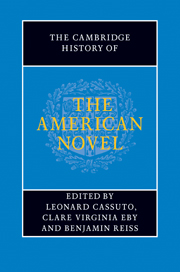Book contents
- Frontmatter
- General Introduction
- PART ONE INVENTING THE AMERICAN NOVEL
- PART TWO REALISM, PROTEST, ACCOMMODATION
- PART THREE MODERNISM AND BEYOND
- Introduction: modernism and beyond
- 37 Stein, Hemingway, and American modernisms
- 38 The Great Gatsby and the 1920s
- 39 Philosophy and the American novel
- 40 Steinbeck and the proletarian novel
- 41 The novel, mass culture, mass media
- 42 Wright, Hurston, and the direction of the African American novel
- 43 Ellison and Baldwin: aesthetics, activism, and the social order
- 44 Religion and the twentieth-century American novel
- 45 Faulkner and the Southern novel
- 46 Law and the American novel
- 47 Twentieth-century publishing and the rise of the paperback
- 48 The novel of crime, mystery, and suspense
- 49 US novels and US wars
- 50 Science fiction
- 51 Female genre fiction in the twentieth century
- 52 Children's novels
- 53 The American novel and the rise of the suburbs
- 54 The Jewish great American novel
- 55 The Beats and the 1960s
- 56 Literary feminisms
- 57 Reimagining genders and sexualities
- PART FOUR CONTEMPORARY FORMATIONS
- A selected bibliography
- Index
41 - The novel, mass culture, mass media
from PART THREE - MODERNISM AND BEYOND
Published online by Cambridge University Press: 28 July 2011
- Frontmatter
- General Introduction
- PART ONE INVENTING THE AMERICAN NOVEL
- PART TWO REALISM, PROTEST, ACCOMMODATION
- PART THREE MODERNISM AND BEYOND
- Introduction: modernism and beyond
- 37 Stein, Hemingway, and American modernisms
- 38 The Great Gatsby and the 1920s
- 39 Philosophy and the American novel
- 40 Steinbeck and the proletarian novel
- 41 The novel, mass culture, mass media
- 42 Wright, Hurston, and the direction of the African American novel
- 43 Ellison and Baldwin: aesthetics, activism, and the social order
- 44 Religion and the twentieth-century American novel
- 45 Faulkner and the Southern novel
- 46 Law and the American novel
- 47 Twentieth-century publishing and the rise of the paperback
- 48 The novel of crime, mystery, and suspense
- 49 US novels and US wars
- 50 Science fiction
- 51 Female genre fiction in the twentieth century
- 52 Children's novels
- 53 The American novel and the rise of the suburbs
- 54 The Jewish great American novel
- 55 The Beats and the 1960s
- 56 Literary feminisms
- 57 Reimagining genders and sexualities
- PART FOUR CONTEMPORARY FORMATIONS
- A selected bibliography
- Index
Summary
Already by 1917, if not earlier, the key elements of an agonized preoccupation with mass visual culture in modern American fiction were in place. What would the triumph of spectacle mean for the viability of the printed novel as a cultural form? What would the onslaught of entertaining images do to the reality referenced by novelistic realism? What narrative techniques could the novel borrow from the cinema or television or, barring that, what could it offer in lieu of sights and sounds? What, finally, does the difference between a reader and spectator portend for modern political subjectivity and the forms of cultural authority to which it may respond?
All of these questions are compressed into a fleeting moment in Edith Wharton's short novel, Summer (1917), where the issue is, indeed, on any number of levels, compression. Venturing forth from Nettleton, the tiny New England village of her upbringing, to the larger town a buggy and then train ride away, Wharton's protagonist Charity Royall enters what appears to be a movie house, though neither it nor the popular medium for which it provides the setting have yet, for her, acquired their familiar names. The young librarian's experiences there as a consumer of culture could hardly be more distinct from those of the reader of a rigorously realistic novel like Summer itself, with its inexorable progression of eminently probable events.
- Type
- Chapter
- Information
- The Cambridge History of the American Novel , pp. 686 - 699Publisher: Cambridge University PressPrint publication year: 2011
- 1
- Cited by



